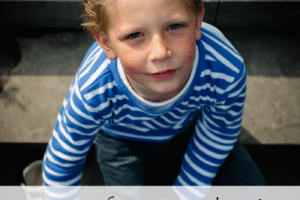Summer Learning Loss: A Simple Plan to Fight It (with free writing jar printable)
I love it.
However, every year about this time, I start worrying about summer learning loss. During the summer, the average child loses one to two months’ worth of academic knowledge. There are articles about it here and here and all over the internet. All of them say the same thing, summer learning loss is real and they each go into detail on how you can try to avoid it.
In the past, I have bought the education books that are full of worksheets from places like Costco for each of my kids. They do five pages and then never look at it again for the rest of the summer.
Here’s the thing, I truly believe that children learn and benefit from having time off to just be kids – to run around outside, to build forts, to make up games, and to not have to learn from a textbook. It engages their brains in a different way than worksheets and tests do.
Yet…there is summer learning loss. I didn’t really feel the significance of summer learning loss until I homeschooled my daughter in fourth grade. We worked on her multiplication tables all year long. Finally, at the end of the school year, she had all of them memorized. I was so happy for her. It had been a lot harder for her than I had imagined.
I randomly quizzed her on them over the summer but no more than a handful of times. I sent her back to public school for fifth grade. She spent months rememorizing the times tables we had worked so hard on the year before. It was frustrating for both of us.
Since then, I have worried about summer learning loss far more than I probably should. I hate to see my children struggle, especially if it’s a struggle they’ve already overcome.
School is about to end and I have a plan. It’s what I would call a simple, relaxed plan. I am not going to be hounding my kids every day to practice math, but I am setting a few expectations to help them stay fresh in a few subject areas. I think summer learning should be fun, not forced…at least not entirely. I’m hoping my children won’t notice too much that they are still learning over the summer.
Writing Jar
I recently wrote a post about making a journal jar as a mother’s day gift. A very creative friend of mine shared an idea that is similar to a journal jar. She made a jar with writing prompts for her kids to work on over the summer.
How awesome is that?
When my kids come to me and tell me they are bored, I’m going to direct them to the writing jar as a way to keep them writing and giving them something to do.
I’ve created a list of questions that I hope my kids will find fun and little silly. I’m giving them the option of drawing a picture with a few words to describe it if they want. I’ve included a printable list of my writing jar questions if you want to use them. Print out the questions, cut them up, stuff them in a jar, and you’ve got a writing jar.
Math is a Wonderful Thing
I find math the hardest skill to practice over the summer, especially for my oldest since she’s started to learn basic algebra. I hate to admit it, but I don’t use algebra very much from day to day. Practicing math skills works best for my kids when they feel like it’s a game.
There are fun math websites like IXL.com that, with an account, allow your kids to earn prizes and badges for completing skills. My kids jump at the chance to play on my computer. Without an account, your kids can play for about 10 minutes. Their game won’t be saved but it still gives them a chance to keep up on their math skills.
Another website I like to let my kids explore is Khanacademy.com. They have videos that explain math concepts but they also cover a wide variety of other topics like art history and biology. You can view many of their videos without an account, but if you want full access you have to sign up for an account
There are other less formal ways to help your kids practice their math over the summer, especially younger kids. You can ask your child to count out the number of plates and silverware needed for dinner. Have them sort a bag of M&M’s, count each color, and make a graph that represents how many they have of each color. Then they get to eat M&M’s!
As parents, we can help our kids stay on top of math by asking the right kind of questions and engaging them in activities that involve a little math. For example, cooking provides a good chance to work on fractions and decimals. Doubling or cutting a recipe in half requires using simple addition and subtraction, plus you could get cookies out of it.
Science
Summer science is one of my absolute favorites. You can pretty much learn about anything and turn it into science. Picking flowers can turn into a short botany lesson if you look up what types of flowers you have when you get home. Blowing bubbles can turn into a physics lesson when you talk about why they are spheres.
You can request books from your local library that explore some of the activities you typically do over the summer. Check out a book about oceans before a trip to the beach. I’m already answering a lot of questions about bees, ants, and mosquitos. I requested a few books to give my kids the ability to look up the answers to their own questions.
There are so many fun science experiments that you can find on online. You can do a quick search on Pinterest or Google will give you hundreds from which to choose. I’ve also included a few of my favorite links. Many of them use things you have around your kitchen. If you are having a hard time entertaining your kids, pull out your vinegar and baking soda and mix them together. The fizz is worth at least 30 minutes of entertainment.
Turn Milk into Plastic – from How Wee Learn
Color Changing Flowers Experiment – from Go Science Girls
Growing Gummy Bear Science – from Playdough to Plato
Why is the Sky Blue? Science Experiment – from Rookie Parenting
Magic Milk Science Experiment – from Laughing Kids Learn
Rainbow Jar – from Playdough to Plato – This is one of my absolute favorite experiments that we did when we were homeschooling. It is so much fun.
If you are having a hard time entertaining your kids, pull out your vinegar and baking soda and mix them together. The fizz is worth at least 30 minutes of entertainment.
Books, Books, Books
I insist that my kids read over the summer. We sign up for our library’s summer reading program every year and we take a weekly trip to the library. I am going to have each of them either write a paragraph or draw a picture of something they’ve read during the week.
I also like to sneak reading in without my kids realizing it. We listen to books on CD while we ride in the car. It is so great. We listen to many books that I don’t think my kids would otherwise read. Additionally, my younger kids can listen to books that are far above their reading level and we all get to enjoy the story together.
If you’re not sure where to start, there are summer reading lists all over the internet – lists for toddlers, lists for 3rd graders, lists for reading aloud, lists of books that are similar to Harry Potter.
Here are a few to give you an idea and a place to start.
Read the Book. Watch the Movie on Netflix. – from Inner Child Fun
A Children’s Librarian’s Absolute Favorite Books for Kids – from Fun at Home with Kids
My Favorite First Novels to Read Aloud with Kids – from Sarah Mackenzie
Picture Books for Little Inventors and Engineers – from What Do We Do All Day?
Summer Reading List for 2nd & 3rd Grade – from Alohamora Open a Book
7th Grade Summer Reading List – from Imagination Soup
Do a Google search for a reading list with your child’s age and I’m sure you’ll get some good results.
Summer Fun Here We Come
I want to spend most of our time this summer having fun and enjoying each other’s company. However, having a summer learning plan in place gives me peace of mind that my kids will be okay once school starts again. Plus, I have activities planned when they inevitably start bugging me that they don’t have anything to do.





2 Comments
Leave your reply.